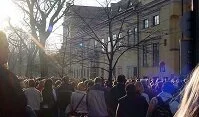Culture & Identity of Poland
Introduction

People gathering in Krakow
Life in Poland is heavily based on family and their religion, Catholicism. However, today many young people are heading to the cities for a university education and jobs, slightly changing the dynamic, but the active social lives found in cities have always had a significant role in Polish culture, especially considering the country was the likely birthplace of vodka.
Today about 60% of the people in Poland live in cities, but this number is slowly growing. However, the rural lifestyle of the people is an important part of the culture and as young people move to the cities, they seem to share their local customs and traditions. From a job perspective, the people are somewhat divided as nearly 15% of the people work in agriculture, another 30% in industry, and the rest work in the services sector, which takes on many forms.
For the farmers the daily way of life revolves around the rising and falling of the sun as well as seasonal variations. The industry and service workers tend to have more static hours, but even these can change as some industry positions have evening and night shifts and many service industries, particularly those in the entertainment and food industries, have evening and weekend hours. For those with more set hours, the regular work day runs from about 7:00 or 8:00 am to about 6:00 pm.